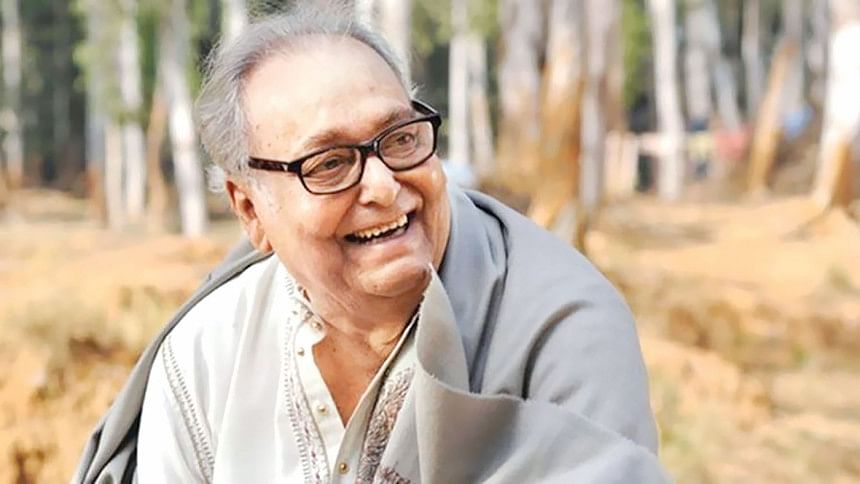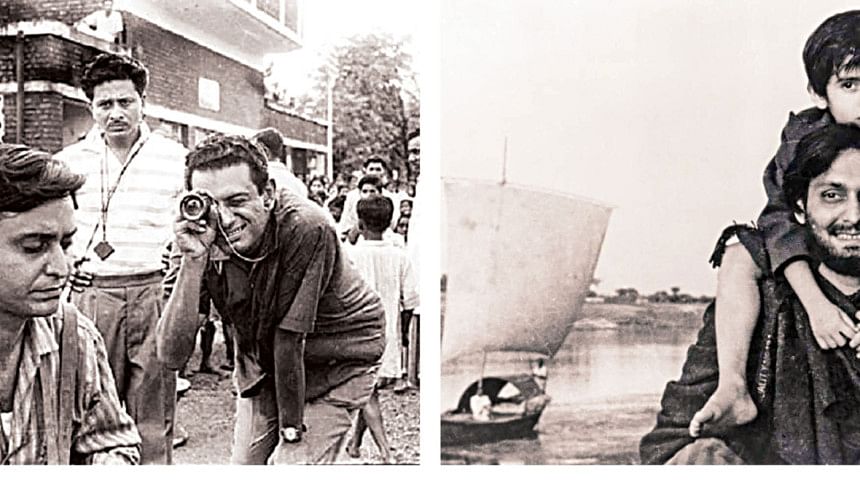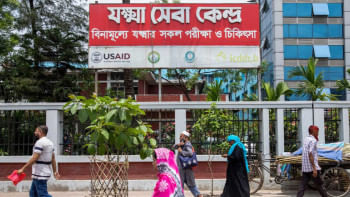The last of the legends bows out

The death of legendary Soumitra Chatterjee yesterday brought an end to the last link of the golden era of Bangalee actors, led by the incomparable Uttam Kumar.
If Uttam Kumar, idolised as "guru" by his fans, was the undisputed super star of Bangalee cinema, Soumitra Chatterjee, with his striking presence and naturalist acting, which another great actor Naseeruddin Shah once said was "sytlelessness and lack of acting", was the quintessentially intelligent actor.
During a career spanning over six decades, Soumitra, a gem discovered by master director Satyajit Ray, donned several hats -- actor, poet, essayist, elocutionist and playwright, and play director.
He was the last of the Mohicans in Bangla cinema, whose outlook and thinking were shaped by the tumultuous decades of the 1943 Bengal famine, the 1946 communal riots and newly independent India's socio-economic and political turmoil.
Born in 1935, Soumitra spent his initial years in Krishnanagar in West Bengal's Nadia district. As his father was in theatre, acting ran in Soumitra's blood.
It was during his childhood that he was introduced to the world of stage acting through family stage performances by his grandfather and father Mohit Chatterjee.
Soumitra's father had taken part in the Indian freedom movement and the actor's grandfather, who espoused radical nationalism, was jailed during the British rule.
As the actor recalled in an interview, his home hosted several noted freedom fighters and social reformers like Bagha Jatin (Jatindranath Mukherjee), Annie Besant, Subhas Chandra Bose, Sarojini Naidu, Dr Rajendraprasad and Kaji Nazrul Islam.
While his father brought him to the stage, it was his mother Ashalata Devi who injected in him an early interest in literature. The parents together shaped the formative years of the great actor.
But it was a play by the doyen of Bengali theatre Sisir Bhaduri, which Soumitra had gone to watch during his college days in Kolkata, that was the turning point in his life as he decided to become an actor.
Soumitra shifted to Kolkata in 1951 after passing his matriculation examination from Howrah Zilla School and took admission in City College on Amherst Street in north Kolkata. There, he was exposed to an exciting cultural landscape of West Bengal as he came close to writers like Shakti Chattopadhyay, Sunil Gangopadhyay and Amitabha Dasgupta, who would often meet at the Coffee House in College Street.
It was in Kolkata that Soumitra came in touch with Satyajit Ray at the Senate Hall of Calcutta University, where a reception was being held for the director and his unit after the success of "Pather Panchali".
One evening in 1956, Nityananda Dutta, Ray's Assistant Director, introduced him to Ray at his residence. The director was scouting for someone to play the role of Apu in "Aparajito". But Ray found the actor a bit too old for the role.
Soumitra, however, did not have to wait long to break into Ray's world.
His handsome frame and manner of dialogue delivery impressed Ray, who roped him in to play Apu in "Apur Sansar", the third movie in the Apu trilogy, alongside Sharmila Tagore.
There was no looking back for Soumitra after that.

Who can forget the picture of a breaded young man, who lost his wife, carrying his son on his shoulders? It is one of the most abiding images of Bangla cinema.
Soumitra found a mentor in Ray and the partnership saw the actor in 14 films and two documentaries of the master director. From Amal in "Charulata", to the adventure-loving young man in "Aranyer Dinratri" to the private sleuth Prodosh Mitter aka Felu, in "Sonar Kella" (1974) and "Joy Baba Felunath" (1979) , Sandip in "Ghare Baire", to the tenacious swimming coach in Koni, the actor's repertoire includes a wide range of characters in commercial and art house films.
The relationship between him and Ray ended with the director's death in April 1992. By that time, the collaboration between the two produced one of the greatest chapters of Bangla cinema through 14 films – "Devi" (1960), "Abhijan" (1962), "Charulata" (1964), "Arayner Din Ratri" (1970), "Ashani Sanket" (1973), "Hirak Rajar Deshe" (1980), "Ghare Baire" (1984), "Ganashatru" (1989) and "Shakha Prashakha" (1990).
Such was the effect of Ray-Soumitra collaboration that many film analysts have often been compared with the duo to the likes of Akira Kurosawa-Toshiro Mifune, Max von Sydow- Ingmar Bergman and Marcello Mastroianni-Federico Fellini.
Soumitra never let go of an opportunity to express his gratitude to Ray.
"I don't know what I would have done if he were not there. Most of my dreams would have remained unfulfilled had I not met him. He [Ray] was an inspiration for me and would always remain alive in me. Manik da [Ray's nickname] had been a mentor for me," he said on several occasions.
Soumitra also worked with other legendary directors of Bangla cinema, such as Mrinal Sen, Tapan Sinha, Tarun Majumdar and Goutam Ghosh through roles in "Kshudhita Pashan", "Akash Kushum", "Kaalbela" and "Ganadevata".
Soumitra's role of the dashingly handsome, swashbuckling, horse-riding grey character Mayurbhan in Tapan Sinha's "Jhinder Bondi" would always remain etched in anyone's memory.
Age failed to wear down Soumitra.
Even at 80, he displayed his acting prowess in national award-winning film "Mayurakshi" (2017), "Bela Sheshe" (2015) and "Posto" (2017).
His success in cinema notwithstanding, the stage remained Soumitra's first love. His famous rendition of William Shakespeare's King Lear in Suman Mukhopadhyay's Raja Lear earned him accolades, while Soumitra himself wrote more than 15 plays and directed more than 30.
"I always loved direct interaction with the audience. Theatre is in my blood. If given a second chance, I would still opt for nothing less than acting on stage," he once said in an interview.
Idealism is something that was in Soumitra's DNA.
A leftist known for his proximity to Marxists and former chief minister Buddhadeb Bhattacharya, Soumitra was on several occasions outspoken on contemporary issues such as intolerance and the demonetisation exercise in 2016.
In 1970s and 80s, he turned down the Indian government's Padma Shri award twice, and in 2001 he refused the national award for best male actor in protest against the alleged "biased attitude" of the award's jury.
Any Bangla film aficionado in the modern era could instantly recall Soumitra's immortal delivery of the dialogue: "fight Koni, fight", while playing the role of a swimming coach egging on his swimmer-student in the 1984 film "Koni."
The actor's fans had been echoing the same dialogue over the last 40 days as he battled for life due to post-Covid complications, which took away one of the greatest personalities of Bangla cinema.

 For all latest news, follow The Daily Star's Google News channel.
For all latest news, follow The Daily Star's Google News channel. 



Comments